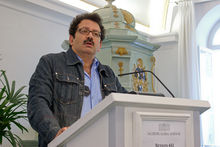- Chibli Mallat
-
Chibli Mallat (May 10, 1960) is a human rights lawyer and a former candidate for presidency in Lebanon.
Contents
Career
In his law practice, he is best known for bringing the case of Victims of Sabra and Shatila v. Ariel Sharon et al., under the law of universal jurisdiction in Belgium, where he won a judgment against the accused before a change in Belgian law removed the jurisdiction of the court. As a democratic activist, he was involved with the Iraqi opposition to Saddam Hussein, even spending time in an Iraqi jail after organizing international monitoring of the first free elections ever in Iraq, in May 1992. Mallat helped establish the Middle East regional office of Amnesty International in Beirut in 1999 for which his office has acted since as its legal counsel. He is a frequent op-ed contributor in newspapers ranging from the Nahar (Lebanon) to the New York Times, and has held research and teaching positions at Yale Law School, London University, Virginia Law School, the University of Lyon, the Library of Congress, the Saint Joseph University and the University of California Boalt School of Law. He spent one year at Princeton University where he was a Visiting Professor in the Woodrow Wilson School, Fellow in the Program in Law and Public Affairs, Fellow in the University Center for Human Values, Fellow in the Program in International and Regional Studies and a Distinguished Visitor in the Bobst Center for Peace and Justice.[1]
In 2007, he moved to Utah and became a professor at the law school at the University of Utah. As of 2010, he holds a Visiting Professorship at Harvard Law School.
Books
He is the editor of over twenty books and his articles in English, French and Arabic have been published in academic journals around the world and he served as a joint general editor for five volumes of the Yearbook on Islamic and Middle Eastern Law.[2][1]
Personal life
He currently resides in Salt Lake City, Utah with his wife and his younger son. His father is Wajdi Mallat, the first president of the Constitutional Council (Arabic المجلس الدستوري) of Lebanon, from 1994 to 1997.
Books
- Introduction to Middle Eastern Law (Oxford University Press, 2007)
- Democracy in America (Beirut, Nahar, in Arabic 2001)
- Presidential Choices (Beirut, 1998)
- The Middle East into the 21st Century (Garnet, 1996)
- The Renewal of Islamic Law: Muhamad Baqer as-Sadr, Najaf, and the Shi'i International (Cambridge University Press, 1993), the later, won the 1993-4 Albert Hourani Book Award of the North American Middle East Studies Association. [1]
- The diversity of Islamic law by Chibli Mallat, Salt Lake City, 20 June 2008, Address at the Afghanistan Project of the SJ Quinney College of Law, University of Utah.
- On Lawyering in Lebanon by Chibli Mallat, Talk presented at Yale law school, May 1, 2008
- Responsibility in the Hizbullah-Israel 2006 War : Jus in bello, jus ad bellum by Chibli Mallat, Address at Yale law school, May 1, 2008
- L'Islande et le Liban: Antipodes de l'UE, Chibli Mallat, David Thor Björgvinsson.
- Dossier sur la Philosophie du droit, Chibli Mallat.
- The speaker's questions which the US government should not answer by Chibli Mallat, The Daily Star, 5 Sept 2007.[3]
References
- ^ a b c Chibli Mallat Former Fellow, Princeton University 2006-2007
- ^ Cotran, Eugene; Chibli Mallat. "Yearbook on Islamic and Middle Eastern Law". Kluwer Law International. http://books.google.com/books?hl=en&lr=&id=tuibyffISZAC&oi=fnd&pg=PR7&dq=Chibli+Mallat+yearbook&ots=2vXk5YK2HM&sig=zdDkI0bUZirw6x_D3DxGRGTus84#v=onepage&q&f=false. Retrieved 2 May 2010.
- ^ Chibli Mallat's Homepage
External links
Categories:- Living people
- Lebanese activists
- Lebanese politicians
- Lebanese lawyers
- Lebanese academics
- Lebanese Maronites
Wikimedia Foundation. 2010.

